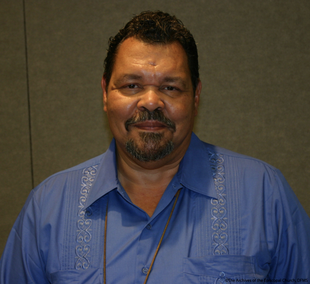 Photo of Canon Rodman at the 2006 General Convention from https://episcopalarchives.org/church-awakens/exhibits/show/leadership/clergy/rodman
Photo of Canon Rodman at the 2006 General Convention from https://episcopalarchives.org/church-awakens/exhibits/show/leadership/clergy/rodman Beginning in his teen years when he became an organizer in the civil rights movement, Canon Rodman was deeply influenced by Ella Baker’s conviction, “what we need are movement-centered leaders, not leader-centered movements,” as this Boston Globe obituary recounted. “It’s not about me, it’s about the people… It’s not about me, it’s about the work.”
As a statement from the Episcopal Diocese of Massachusetts recently reflected, “Ed Rodman was known churchwide as a strategist, advocate and activist for social and racial justice, and as an educator and mentor across generations in The Episcopal Church.” His strategic advice, solidarity, and encouragement were instrumental in TransEpiscopal’s early years as we sought to bring our voices and witness to the wider Episcopal Church. In the wake of the 2006 General Convention, when our early efforts to change the church’s nondiscrimination canons fell short, Canon Rodman offered compassionate encouragement and sage counsel: join the Consultation.
The Consultation is a coalition of progressive organizations within the Episcopal Church that since 1985 has worked intersectionally to support the justice-oriented goals of its groups at the Episcopal Church’s triennial General Convention. Thanks to Canon Rodman’s counsel, TransEpiscopal applied and was accepted into this consortium in 2007. (In fact, a press release about this acceptance constituted the first post we made to our blog.) The gift of his mentorship and solidarity opened a door for TransEpiscopal to organize ourselves more effectively and to join in the crucial coalitional advocacy that the Consultation had been doing for decades. Racial and economic justice, the ministry of all the baptized, commitment to peace, gender and sexuality justice – TransEpiscopal has been working side by side with our partners around this intersectional table since 2007, thanks Canon Rodman’s wisdom and support.
We also want to lift up and appreciate how Canon Rodman’s outreach to us highlights a powerful, long-standing pattern of Black leaders and communities within the Episcopal Church opening up liberating, life-giving spaces of solidarity across racial, economic, gender, and sexuality lines. The Honorable Byron Rushing – former Vice President of the House of Deputies, retired former Massachusetts state legislator, and long-time Consultation leader – is another powerful example of such solidarity: several times over he co-sponsored legislation in Massachusetts protecting transgender people against discrimination as well as one of the first resolutions to pass General Convention in support of our community (D012). This pattern of support is also dramatically showcased in the recently released documentary The Philadelphia Eleven, in which we witness the historically Black parish, the Church of the Advocate, opening its doors in 1974 to the first women to be ordained priests in the Episcopal Church. The late Bishop Barbara C. Harris, who was the Senior Warden of Church of the Advocate and served as the crucifer at the Philadelphia ordinations; who was a founder of the Consultation; and who became the first woman bishop in the Anglican Communion in 1989; was also a crucial early supporter of TransEpiscopal’s work.
We are so grateful for the inspiration, solidarity, and liberating energy that Canon Rodman and so many others have unleashed in our beloved Episcopal Church. As we give thanks for Canon Rodman’s life, may we honor it by continuing the coalitional work he invited us to step further into. May we do this work together, in community, welcoming others as he welcomed us.

 RSS Feed
RSS Feed